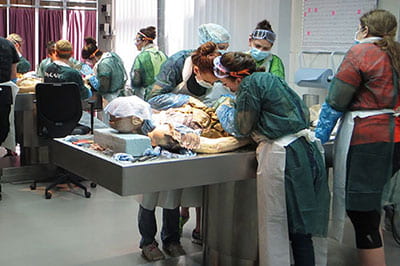 It was a return trip for UW-Green Bay Human Biology professors Amanda Nelson and Donna Ritch, but a whole new world for 17 UWGB Human Biology and Bellin College of Nursing students.
It was a return trip for UW-Green Bay Human Biology professors Amanda Nelson and Donna Ritch, but a whole new world for 17 UWGB Human Biology and Bellin College of Nursing students.
The group recently returned home from a summer travel course to Guben, Germany, and a chance to work with world-renowned German anatomist Gunther von Hagens — inventor of the preservation process plastination, now made famous by the Body Worlds touring exhibits.
The course is designed around the use of human cadavers in teaching and research environments, which includes the four-day workshop at the Plastinarium and a trip to Auschwitz. The students were able to meet and pose for a picture with von Hagens during a tour of the facilities.
The workshop led students through each step of the process of plastination, from autopsies to dissection to tissue dehydration to positioning to curing. In addition to completing a full dissection of two human cadavers, the UWGB students had other opportunities — injecting and positioning animal hearts and kidneys, among them.
(Click thumbnails to enter slideshow view.)



















Human Biology senior Crystal Remsza and her roommate Bridget Schedler decided to explore the experience together.
“I figured any experience I can get will help me in the long run, but it turned out better than I expected,” Remsza said. “The plastinarium experience was incredible,” Remsza said. “Dr. Nelson told us before leaving that we would get a lot of hands on experience and she was absolutely right. Dissecting cadavers was something I never imagined myself doing, but I loved it. I was able to apply everything I’ve learned about the human body from my classes to a real specimen in front of me. The coolest part of my time at the plastinarium was removing all of the internal organs in one piece. There were four of us working on this and once we finally removed everything from the heart, lungs, intestines, etc. it was a proud moment!”
Schedler, a senior from Grafton, Wis., who hopes to be a physical therapist one day, said the experience was “amazingly unforgettable.” “I gained a unique perspective on human anatomy that cannot be taught from a book. It was much more intriguing than anything I thought it could be.”
Likewise, senior human biology major Kelly Strasser said that everyday the trip provided a unique experience.
“From your basic muscle dissection of human cadavers to an all-out autopsy, we were able to carry out tasks I had never anticipated would be possible as an undergraduate student,” Strasser said. “Most importantly, the freedom that we were given to explore and problem solve during our dissections was incredible. The staff encouraged us to figure out on our own which techniques were most effective for a given task. This helped to build our independence and confidence as students.”
The students’ enthusiasm is something Prof. Nelson, who was leading her third course to Guben, has come to expect.
“The students were very engaged in the process of plastination and their intense focus was palpable by the plastinarium staff,” said Nelson. “They were in awe of the hands-on experience they received. If they wanted to do something, they just asked and soon found themselves doing just that (i.e., using a saw to remove a human skull, witnessing the preparation of a lion display).”
“In addition to the content of the course, I always hope that the students immerse themselves in the culture of the countries we visit,” said Nelson, who has led her third summer tour to Guben.
The group enjoyed side trips to both Krakow and Prague, embracing the culture of Poland and the Czech Republic, according to Nelson, and visiting a concentration camp, as well.
“That visit prompted discussion of Nazi experimentation and the controversy regarding the use of the results of these experiments,” she said. “Prior to traveling, the students were required to give group presentations on similar topics, such as organ/body donation, eugenics, Nazi experimentation.
The experience will pay dividends down the road, when most of the students prepare for medical careers and graduate school.
“Without a doubt, this experience provides a unique talking point at a graduate school interview,” Nelson said. “Securing a seat in a professional program has become increasingly difficult and this course is a highlight on many of our students’ resumes.”
Remsza, who hopes to be accepted into dental school upon graduating from UWGB in May of 2016, said the experience have her a glimpse of a future in the medical field.
“This experience was important to me because it allowed me to really imagine myself with a career in the medical field,” she said. “I am even more anxious to go on to dental school and I’m curious to see what my future holds.”
Strasser, who will begin applying to athletic training programs at the end of this summer sees a direct link between this trip and pursuing her future career goals.
“I now have so much I can add to my resume for graduate school applications,” she said. “With programs being so competitive, it is important to participate in activities that make your resume stand out. My experiences in the plastinarium will certainly do that. I now have all these unique experiences I can draw from for my application and interview processes that will help me stand out and be remembered.”

